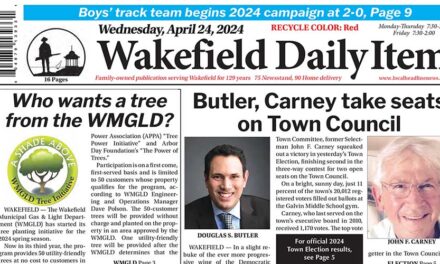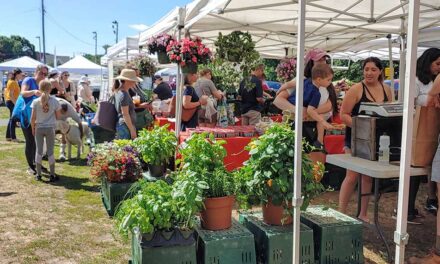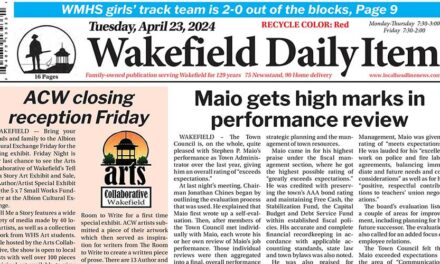Published August 22, 2019
By DAN TOMASELLO
LYNNFIELD — The Finance Committee voted 8-2 on Aug. 19 to recommend a proposed warrant article seeking to complete the Wakefield-Lynnfield Rail Trail’s final design.
The Friends of the Lynnfield Rail Trail submitted a citizens’ petition containing 325 signatures on Aug. 20 requesting that a Special Town Meeting be held in September. The Board of Selectmen is scheduled to set the Special Town Meeting date during a meeting Tuesday, Aug. 27.
“We had an overwhelming response even with people on summer vacation,” said Locksley Road resident Patrick Curley, a Wakefield-based attorney. “We had to turn people away.”
Curley said the warrant article will request the Special Town Meeting to appropriate $348,000 in order to cover the $10 million rail trail’s final design engineering costs. He noted the Massachusetts Department of Transportation (MassDOT) will be paying for the project’s construction costs.
“We are asking for funds from the town to show that Lynnfield has skin in the game,” said Curley. “According to the Massachusetts Department of Transportation, which controls the construction funds that have already been allocated for this rail trail, they are looking for readiness factors. Putting money into the final design is a show of readiness. The state does not pay for all of the design costs.”
Curley noted the town was awarded a $100,000 reversible grant from the Massachusetts Department of Conservation and Recreation last year, which he said would reduce the final design price tag to $248,000. He said the grant will expire on July 1, 2020.
“The grant can be put toward Lynnfield’s share of the final design costs,” said Curley. “It’s a reimbursement grant. If we don’t spend the funds, we lose the grant.”
Curley expressed doubts that a $500,000 earmark included in the Environmental Bond Bill signed into law last year will be released. He said representatives from state Sen. Brendan Crighton and state Sen. Jason Lewis’ respective offices informed him there is no guarantee the funds designated for the project’s final design will be released to Lynnfield and Wakefield.
“Even if the state did release the funds, if you divide $500,000 by two, that is $250,000,” said Curley. “That is not enough money to cover Lynnfield’s share of the final design costs. There is no guarantee the state will release those funds.”
Curley recalled that MassDOT recently pushed the project back from 2021 to 2023. He believes appropriating the final design costs will expedite the project.
“The investment of $348,000 unlocks a $10 million asset that will be available for everybody in Lynnfield,” said Curley. “It’s a huge return on investment. Delay means another generation loses out on a rail trail. This is something we have talked about for two decades. Now is the time to do it.”
Residents weigh in
After Curley concluded his presentation, rail trail supporters and opponents continued their long-standing tradition of debating the project’s pros and cons.
Patrice Lane resident Pat Campbell aired concerns about the rail trail’s impact on public safety and DPW costs. She also inquired if funds included in the fiscal year 2020 operating budget would be used to fund the engineering costs.
Finance Committee Chairman Chris Mattia said Town Administrator Rob Dolan informed him funds in the town’s Sale of Real Estate Account and the Overlay Account can be allocated for the rail trail’s final design.
Meservey Lane resident Stephen Sorrentino argued the rail trail is not a good investment. He expressed concerns about declining new revenue growth in town and its impact on the town’s operating and capital budgets.
“If I am going to make a $348,000 investment, I would rather make it in the school system, Police Department and Fire Department,” said Sorrentino. “A rail trail would only benefit a small percentage in this town.”
Meservey Lane resident Jill Jorgenson argued rail trail supporters should use the Independence Greenway in Peabody instead of trying to build a trail in Lynnfield.
“It wouldn’t cost us anything,” said Jorgenson. “It wouldn’t disturb residents and wouldn’t disturb Reedy Meadow.”
Edward Avenue resident Eileen Goodwin said rail trails are well maintained, not dangerous and are community assets.
“The fields at the high school don’t serve the whole town,” said Goodwin. “They serve a small minority in the town. Everyone will be able to use the rail trail.”
Fernway resident Bob Miller noted he has spent a lot of time using rail trails the last few years.
“From newborns in strollers to the elderly in wheelchairs, there is a very large cross section of people who use rail trails,” said Miller. “It’s not only for bicyclists. There is a large cross section of our town who will use it a great deal. There is some controversy about the marsh and we need to take good care of the marsh. This is an opportunity for people to enjoy the marsh.”
FinCom expresses support
After the presentation and discussion concluded, the Finance Committee weighed-in on the proposed warrant article.
Finance Committee member Nancy Alexander expressed her opposition to allocating funds for the rail trail.
“I think a rail trail would be a great asset for the town, but we don’t take care of what we have,” said Alexander. “Our streets and sidewalks are cracked and crumbling. I am afraid that it will be gorgeous for a couple of years and then it will go to crap because that is what seems to happen. This is nuts.”
Finance Committee member Stephen Riley concurred with Alexander’s opinion.
“I have lived in town for 52 years,” said Riley. “I have seen a lot of changes and there are a lot of changes that don’t help the town. You saw that with the (Woods of Lynnfield elderly housing) development that was defeated. That was a huge change for Lynnfield and voters shot it down. Hopefully the committee will not recommend the article.”
Finance Committee member Gene Covino expressed his support for the warrant article.
“For me, it’s all about the (DCR) grant,” said Covino.
Finance Committee member Kevin Sullivan agreed.
“It’s a 3 percent investment,” said Sullivan. “For $348,000, we get a $10 million project. It’s a good return on our money. My kids won’t enjoy a rail trail and I felt the same way when I served on the Fields Committee. My kids didn’t benefit from the fields but I thought it was a good thing for the town. Why wait another generation? The town has never been this close to achieving a rail trail and I hope the committee will vote to recommend the article.”
Finance Committee Vice Chairman Tom Kayola echoed Covino and Sullivan’s point of view.
“This opportunity looks extremely beneficial for the town,” said Kayola. “Obviously it’s an emotional subject and you cannot put a dollar amount on quality life. Some people are passionately for it and some people are passionately against it. We’ll see how the town votes at Town Meeting. This is an opportunity to get our skin in the game and signal to the state that we want to move forward with this project. From a financial perspective, it makes sense for the town.”
After the discussion, Mattia, Kayola, Covino, Sullivan and Finance Committee members Chris Caprio, David Pizzotti, David Morales and A.J. Qualtieri voted to recommend the rail trail article. Alexander and Riley voted no.




